If it's raining in St. Albert in May you know it is Rainmaker Rodeo weekend. Rain for the rodeo is a beloved local tradition, akin to sitting in traffic on St. Albert Trail. It's a tradition that dates back to 1965, the first year the St.
If it's raining in St. Albert in May you know it is Rainmaker Rodeo weekend. Rain for the rodeo is a beloved local tradition, akin to sitting in traffic on St. Albert Trail. It's a tradition that dates back to 1965, the first year the St. Albert Kinsmen held a rodeo. Rodeo 104 was set for June, with the rodeo grounds at the bottom of St. Vital Hill (a.k.a. Mission Hill or Seven Hills today). It rained so much the rodeo was cancelled. The Kinsmen tried again in August. It rained again. But they held the rodeo anyway and a tradition was born. By 1974 the rodeo had been officially named Rainmaker.
The Kinsmen are eternally optimistic about Rainmaker, arguing that the rainy reputation is undeserved, with many years relatively free of rain. Relatively, indeed. I noticed organizers placed a hopeful weather forecast on the Rainmaker website on May 13: "14 Day Trend Showing Sunny and Warm for Rainmaker Weekend."
Hope springs eternal for a St. Albert Kinsman.
I'm from Ontario originally so find the whole idea of Canadian rodeo slightly strange. I grew up reading stories about Sam Steele and the North West Mounted Police, their march west to establish peace, order and good government. Didn't the Mounties send the American cowboys and whisky-traders packing? Rodeo seems an especially awkward fit for St. Albert, given the city's unique history, founded by French-speaking priests, First Nations and Métis people.
But I suppose a rodeo in urban, car-oriented 21st century St. Albert is no more odd than my son spending the weekend watching endless hours of the Giro d'Italia, the Italian bicycle race on TV.
For a great look at these issues of rodeo and authenticity, pick up Mary-Ellen Kelm's 2011 book, A Wilder West: Rodeo in Western Canada. Kelm treats rodeo seriously, focusing on rodeo's role in Western Canadian history. She calls rodeo a "contact zone", bringing people together across racial, gender and class divides. In her chapter, When the Cowboys Are Indians she quotes Calgary Stampede bronc rider Ed Calf Robe: "Cowboys and Indians really got along; it's only in Hollywood they fight. All Indians are cowboys at one time or another."
It's like the rock and country fans at Rainmaker, mixing peacefully together over the weekend over a beer. Or two.
